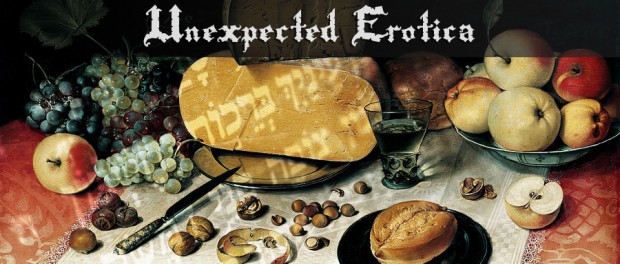Perfume at the Table – Song of Songs 1:12

Song of Songs 1:12
- KJV: While the king sitteth at his table, / My spikenard sends forth the smell thereof.
- NIV: While the king was at his table, / My perfume spread its fragrance.
- NASB: While the king was at his table, / My perfume gave forth its fragrance.
As read in many translations, this scene depicts a royal enjoying a banquet meal at the palace while his lover stands near enough for her perfume to distract him, keeping his thoughts occupied on his love rather than his food. A sweet scene, for sure. Even if you take the royal title to be a typical hyperbolic term of endearment (as I do), the scene’s description is still beautiful in a most innocent way.
Well, this isn’t “Obvious Innocence” but rather “Unexpected Erotica”, so I apologize if this scene holds any special meaning to you as a saccharine setting.
This “perfume” is like a foggy haze that surrounds him, period.
There’s a couple things to note here. First, the Hebrew root used here, mêcab, actually means “surround” not “table” or any other furniture. Carr suggests this “is perhaps best understood here as ‘among his own surroundings’.” He notes the context includes both a banquet concept seen in the first few verses of chapter two and a bedroom concept seen in verses 4 and 16 of this first chapter. There is nothing tying this line to either motif, and the language seems deliberately ambiguous on this point.
Recognizing the Hebrew’s true meaning communicates something more than a dinnertime distraction. This “perfume” is like a foggy haze that surrounds him, period. Banquet table, bedrooms, hills, fields, orchards, streets, shops, and courtyards: wherever he goes, this “perfume” surrounds him. As Kinlaw writes, “her presence as a reality in his life sounded him like a choice perfume.”
The scene is made more complicated by this interpretation, but it’s certainly not erotic. If anything, this just makes it sound like an overly clingy woman following her man around everywhere he goes, possibly with an annoying habit of spritzing perfume all day long.
Ah, but the perfume. That’s the kicker. What is it?
A disarming cloud of unyielding, unrelenting magnetism follows him wherever he goes as a continual onslaught of feminine sex appeal.
The word isn’t a generic label for perfume. It’s specifically nard, or more precisely spikenard (the purest of nard) as seen in the KJV. Not just perfume. This might not have much meaning for us, so a little background helps.
One would extract nard from the Himalayan region of India, far from the Palestinian setting of the Song, making it very expensive to import at all, much less in this purest of forms (spikenard). But more than this, the exotic fragrance “was used as a love charm in the ancient Near East” according to Kinlaw. This love potion, as Carr calls it, would have been highly valued for its scarcity, and its supposed potency in this form would have been extreme. And with this, suddenly this verse takes on a whole new meaning.
Instead of depicting a pleasant aroma tickling his nose while he enjoys a falafel, this verse depicts a perpetual fog of magic seduction.
And remember who is speaking here: these are her words citing her intentions for him. She’s saying she’ll entice him no matter his surroundings. She’ll allure him at the banquet hall and she’ll tempt him in the street. She’ll charm him at the in-laws and enchant him in the bedroom. Her spell will captivate him like a love potion he can’t escape, even if he wanted to. A disarming cloud of unyielding, unrelenting magnetism follows him wherever he goes as a continual onslaught of feminine sex appeal.
She won’t have to follow him around all the time. Her spell will tackle that for her. She’ll be in his head.
That’s not a sweet-smelling bystander at dinner. That’s an almost menacing threat of sexual fervor.
Sorry if that ruins it for you.
Originally posted 2015-07-27 08:00:12.


Leave a Reply